
The New Hampshire Wildcats, or 'Cats, are the American intercollegiate athletic teams representing the University of New Hampshire (UNH), located in Durham. The wildcat is the school's official mascot, the colors are UNH Blue and white. The University of New Hampshire competes at the National Collegiate Athletic Association (NCAA) Division I level as a full member of the America East Conference, and sponsors teams in seven men's, eleven women's and one coed NCAA sanctioned sports. However, the men's and women's hockey teams are members of Hockey East, the gymnastics team is a member of the East Atlantic Gymnastics League (EAGL), and the ski team is a member of the Eastern Intercollegiate Ski Association (EISA). The football team plays as an associate member of the Colonial Athletic Association in the NCAA Division I Football Championship Subdivision, the second tier of Division I formerly known as Division I-AA.

Edward Morgan Lewis, otherwise known as Ted Lewis, was a Welsh born, American Major League Baseball right-handed pitcher as well as a professor of English literature, academic administrator, the tenth president of the Massachusetts Agricultural College and fifth President of the University of New Hampshire.

The New Hampshire Wildcats football program is the intercollegiate American football team for the University of New Hampshire located in the U.S. state of New Hampshire. The Wildcats compete in the NCAA Division I Football Championship Subdivision (FCS) and are members of the Colonial Athletic Association (CAA). The team plays its home games at the 11,000 seat Wildcat Stadium in Durham, New Hampshire, and are led by head coach Ricky Santos.
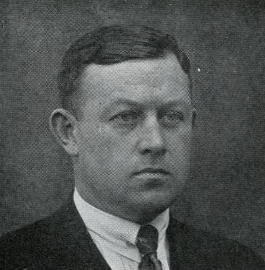
William Harold "Butch" Cowell was an American football player and coach of football, basketball, and baseball. He is best known for his tenure as head coach of the New Hampshire Wildcats football team from 1915 to 1936.

The Battle for the Brice–Cowell Musket is the rivalry between the Maine Black Bears and the New Hampshire Wildcats. Both schools are members of the Colonial Athletic Association (CAA). Through the 2022 season, the two teams have met 112 times on the football field, with New Hampshire currently holding a 58–46–8 edge in the all-time series.
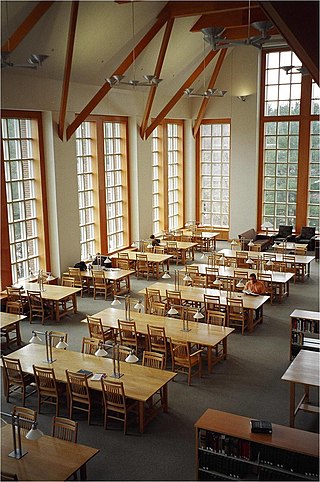
Robert Morin was a librarian at the University of New Hampshire's Dimond Library from 1965 to 2014 where he catalogued DVDs, CDs, and music scores. He donated $4 million to the university in his will, and a scandal later emerged after the university spent a quarter of it on a new football scoreboard.

The 1941 New Hampshire Wildcats football team was an American football team that represented the University of New Hampshire as a member of the New England Conference during the 1941 college football season. In its fifth year under head coach George Sauer, the team compiled a 4–3–1 record, outscoring their opponents 153–62.

The 1940 New Hampshire Wildcats football team was an American football team that represented the University of New Hampshire as a member of the New England Conference during the 1940 college football season. In its fourth year under head coach George Sauer, the team compiled a 5–3 record, outscoring their opponents 121–86.
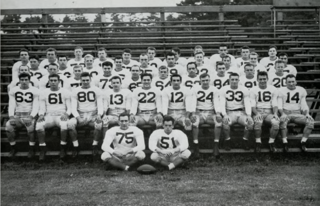
The 1948 New Hampshire Wildcats football team was an American football team that represented the University of New Hampshire as a member of the Yankee Conference during the 1948 college football season. In its third year under head coach Bill Glassford, the team compiled a 5–3 record, outscoring opponents 155–103.

The 1937 New Hampshire Wildcats football team was an American football team that represented the University of New Hampshire as a member of the New England Conference during the 1937 college football season. In its first year under head coach George Sauer, the team compiled a 7–1 record, outscoring their opponents 144–31. Five of the team's wins were by shutout. The team played its home games at Lewis Field in Durham, New Hampshire.

The 1936 New Hampshire Wildcats football team was an American football team that represented the University of New Hampshire as a member of the New England Conference during the 1936 college football season. In its 21st season under head coach William "Butch" Cowell, the team compiled a 3–3–2 record, outscoring their opponents 137–76. The team scored 120 of their points in two shutout wins, and only 17 total points in their other six games. The team played its home games at Lewis Field in Durham, New Hampshire.

The 1935 New Hampshire Wildcats football team was an American football team that represented the University of New Hampshire as a member of the New England Conference during the 1935 college football season. In its 20th season under head coach William "Butch" Cowell, the team compiled a 2–5–1 record, being outscored by their opponents 55–120. The team scored 47 of their points in two shutout wins, and only eight total points in their other six games. All five losses came in away games; the team had two wins and a tie at home. The team played its home games in Durham, New Hampshire, at Memorial Field.
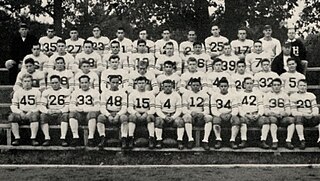
The 1934 New Hampshire Wildcats football team was an American football team that represented the University of New Hampshire as a member of the New England Conference during the 1934 college football season. In its 19th season under head coach William "Butch" Cowell, the team played its home games in Durham, New Hampshire, at Memorial Field. The team compiled a 3–4–2 record, being outscored by their opponents 89–148, while going undefeated at home, registering two wins and two ties in Durham.

The 1933 New Hampshire Wildcats football team was an American football team that represented the University of New Hampshire as a member of the New England Conference during the 1933 college football season. In its 18th season under head coach William "Butch" Cowell, the team played its home games in Durham, New Hampshire, at Memorial Field. The team compiled a 3–3–1 record, and were outscored by their opponents, 65–51.
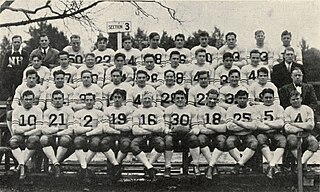
The 1932 New Hampshire Wildcats football team was an American football team that represented the University of New Hampshire as a member of the New England Conference during the 1932 college football season. In its 17th season under head coach William "Butch" Cowell, the team played its home games in Durham, New Hampshire, at Memorial Field. The team compiled a 3–4–1 record, and were outscored by their opponents, 110–105. All four losses came in away games, while the team recorded three wins and a tie in Durham.

The 1931 New Hampshire Wildcats football team was an American football team that represented the University of New Hampshire as a member of the New England Conference during the 1931 college football season. In its 16th season under head coach William "Butch" Cowell, the team compiled a 7–2 record, and outscored their opponents, 171–84. The team played its home games in Durham, New Hampshire, at Memorial Field.

The 1930 New Hampshire Wildcats football team was an American football team that represented the University of New Hampshire as a member of the New England Conference during the 1930 college football season. In its 15th season under head coach William "Butch" Cowell, the team compiled a 5–2–1 record, and outscored their opponents, 160–54. The team played its home games in Durham, New Hampshire, at Memorial Field.

The 1929 New Hampshire Wildcats football team was an American football team that represented the University of New Hampshire as a member of the New England Conference during the 1929 college football season. In its 14th season under head coach William "Butch" Cowell, the team compiled a 7–2 record, and outscored their opponents, 162–78. The team played its home games in Durham, New Hampshire, at Memorial Field.

The 1924 New Hampshire football team was an American football team that represented the University of New Hampshire as a member of the New England Conference during the 1924 college football season. In its ninth season under head coach William "Butch" Cowell, the team compiled a 7–2 record, and outscored opponents by a total of 213 to 49. The team played its home games in Durham, New Hampshire, at Memorial Field.

The 1921 New Hampshire football team was an American football team that represented New Hampshire College of Agriculture and the Mechanic Arts during the 1921 college football season—the school became the University of New Hampshire in 1923. In its sixth season under head coach William "Butch" Cowell, the team compiled an 8–1–1 record, only losing to Dartmouth, while outscoring their opponents by a total of 234 to 66.





















